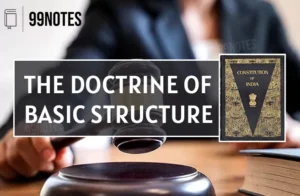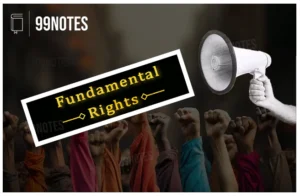10 Oct 2023 : Daily Answer Writing
Mains Answer Writing
10-october-2023
Q1) The doctrine of Parliamentary sovereignty and judicial supremacy has exerted considerable influence in shaping the constitutional frameworks of India and the USA. Citing relevant case laws discuss the role of the judiciary in influencing the constitutions in these countries. Is the scope of judicial review wider in India?
ANSWER:
According to the principle of parliamentary sovereignty, Parliament is the supreme law-making authority and can make, unmake, or amend any law. No other body can overrule or invalidate an Act of Parliament. This doctrine originated in the United Kingdom. Whereas in contrast, the doctrine of judicial supremacy gives the judiciary the final say on the meaning and application of the law. This means that if a court finds that a law is unconstitutional, it can strike it down or declare it invalid.
PARLIAMENTARY SOVEREIGNTY AND JUDICIAL SUPREMACY IN INDIA AND USA
In the USA, judicial supremacy is enshrined in the Constitution and has been a key feature of the American legal system. But, in India, the Constitution provides for both parliamentary sovereignty and judicial supremacy. The Supreme Court has the power to strike down unconstitutional laws, but Parliament can also amend the Constitution and override court decisions in some cases. This has led to some tension between the judiciary and legislature.
Thus, tussle between the two doctrines, the doctrine of parliamentary sovereignty and the doctrine of judicial supremacy plays a considerable role in shaping the constitutional frameworks of India and the USA. This is manifested through various case laws that influenced the Constitutions of India and the USA. Some of them are
ROLE OF THE JUDICIARY IN INFLUENCING THE CONSTITUTION OF INDIA
- A.K. Gopalan vs. State of Madras and L.Chandra vs. Union of India: In these cases, the Supreme Court explicitly declared that the judiciary has the power to judicially review any law under Article 13 to the extent it violates the rights given under Part III of the Constitution.
- I.C. Golaknath vs. the State of Punjab, 1967: The Supreme Court in this case decided that the powers of the Parliament to amend the Constitution under Article 368 does not include the power to amend the Fundamental Rights, thus severely curtailing the amending powers of the Parliament. The Parliament reacted by passing the 24th Constitutional Amendment, in 1971.
- Keshavanand Bharati vs. State of Kerala, 1973: This landmark judgment outlined the principle of “Basic Structure Doctrine”. Through this judgment, the Supreme Court declared that the amending powers of the Parliament are restricted by the “Basic Structure” of the Constitution.
- Maneka Gandhi vs. Union of India, 1978: The Supreme Court in this judgment expanded the scope of Article 21 of the Constitution. This judgment led to a broader interpretation of Fundamental Rights and has led to the expansion of the scope of Part III beyond the conventional readings.
- Minerva Mills vs. Union of India, 1980: Through this case, the Supreme Court established the relationship between the Fundamental Rights under Part III and the DPSPs under Part IV making them complementary to each other.
- S.R. Bommai vs. Union of India, 1994: Through this case, the Supreme Court provided stability to the State Governments and restricted the Union’s power to proclaim President’s Rule in States. Through this case, the Supreme Court strengthened the federal structure of the Indian Constitution.
- NJAC Case, 2017: Supreme Court struck down the 99th Constitutional Amendment which established NJAC stating it is in violation of the principle of judicial independence which is a part of the Basic Structure of the Constitution.
- Navtej Singh Johar vs. Union of India, 2016, Sabarimala Case, 2020, Triple Talaq Case, 2017: In recent times, the Supreme Court has taken the interpretation of the Constitution, laws, and Acts in a manner to reflect the mind and purpose of the Constitution makers.
ROLE OF THE JUDICIARY IN INFLUENCING THE CONSTITUTION OF THE USA
- Marbury vs. Madison, 1803: This landmark case from the United States established the principle of judicial review, which gives the Supreme Court the power to strike down laws that are deemed to be unconstitutional.
- Roe vs. Wade, 1973: This landmark judgment established the Right to Abortion as a Constitutional Right and struck down the State Laws that restricted access to abortion. The case demonstrated the role of the judiciary in interpreting the US Constitution and protecting individual rights.
- Planned Parenthood vs. Casey, 2022: The US Supreme Court, in a 6:3 judgment, overturned Roe vs. Wade judgment, In this manner, the Supreme Court moved back from due process to procedure established by law. But this case showed that in the US, the principle of judicial supremacy takes precedence over the principle of parliamentary sovereignty.
JUDICIAL REVIEW IN INDIA
The Supreme Court in India described judicial review as a part of the Basic Structure of the Constitution. This was reiterated in the I. R. Coelho vs. State of Tamil Nadu, 2007. Articles 13, 32, and 226 read with Articles 136, 139, 141, and 142 provide the Indian Supreme Court, the power to judicial review. The scope of judicial review in India has evolved since independence through cases like A.K Gopalan, I.R. Coelho, S.R. Bommai, etc. However, there are certain areas where there is scope of judicial review is still limited Some of them are:
- The privileges and rights conferred on the MPs and MLAs under Articles 105, 191, and other conventions.
- The role of the Speaker under the Anti-Defection Law was discussed in the Keisham Meghachandra vs. Hon’ble Speaker of Manipur Legislative Assembly, 2021.
- The role and jurisdiction of Governors under Article 152 of the Constitution and misuse of the discretionary powers.
- The ambiguities, and irregularities during the conduct of proceedings of the Legislatures. This is prohibited under Article 211 of the Constitution.
However, many times courts have taken some decisions, which had various implications on society and were not well thought out. There are also allegations from the executive and legislature of the judiciary interfering or overreaching its duties.
Thus, there is a need to balance the power of judicial review and prevention of judicial overreach. The line between judicial activism and judicial overreach is very thin, thus the courts must restrain themselves until the matter before them has very large implications.
Upload Answer here
2. Examine the role of agricultural research in addressing food security and sustainable farming practices in India. Highlight the challenges faced by the agricultural research sector and suggest policy measures to overcome them. (250 words)
Answer Will Upload Tomorrow at 12 PM….
Upload Answer here
3. What are the key challenges to media freedom and individual privacy in the digital age, and what measures can be taken to protect these fundamental rights in India?
Answer Will Upload Tomorrow at 12 PM….
Upload Answer here
4. Examine the challenges faced by informal workers in India in terms of mental health and suggest measures to improve their mental well-being.
Answer Will Upload Tomorrow at 12 PM….
Upload Answer here
5. Critically examine the benefits and challenges of live streaming Supreme Court cases in India. Suggest measures to mitigate the challenges and maximize the benefits of live streaming.
Answer Will Upload Tomorrow at 12 PM….
Upload Answer here
6. What are the challenges associated with the identification and administration of Scheduled Areas in India?
Answer Will Upload Tomorrow at 12 PM….
Upload Answer here
7. Discuss the security and socio-political challenges posed by the India-Myanmar border. Suggest measures to address these challenges effectively.
Answer Will Upload Tomorrow at 12 PM….
Upload Answer here
For Enquiry

11 Oct 2023 : Indian Express

11 Oct 2023 : PIB

11 October 2023 : Daily Current Affair

11 October 2023 : The Hindu Editorial Notes PDF

YOJANA SUMMARY (JUNE 2023)

June Kurukshetra – Water Conservation

Yojana Magazine: July 2023

Kurukshetra July 2023: Summary

The Doctrine of Basic Structure

Fundamental Rights



